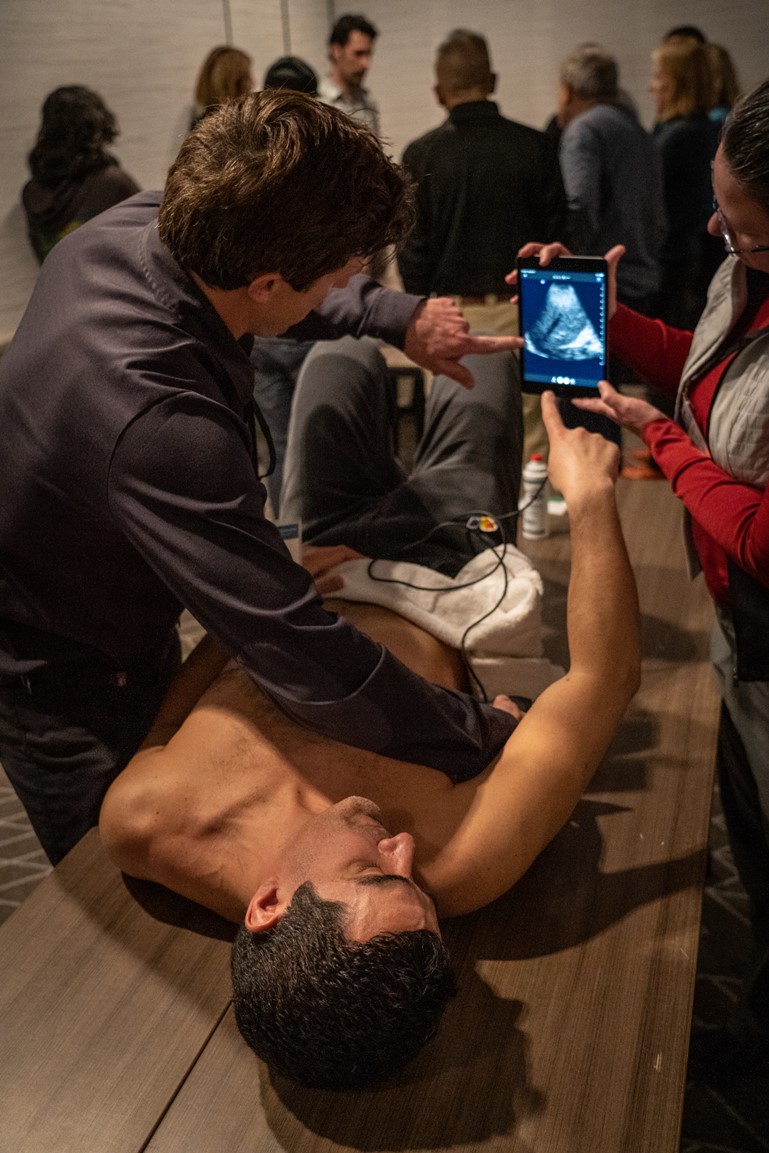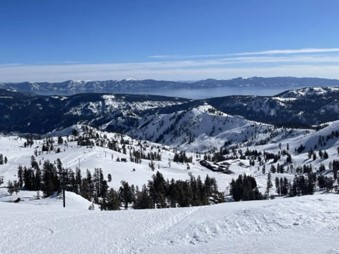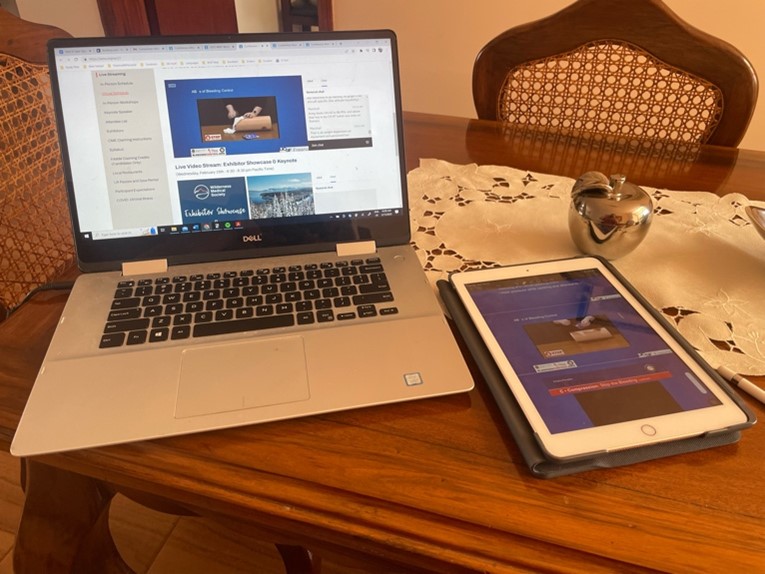Breaking Down Barriers: Highlights from the 2023 WMS Winter Conference
Jake Bauer, MS1
University of Nevada, Reno
As a medical student who had the incredible opportunity to receive a scholarship from the WMS to attend their recent annual winter conference in Olympic Valley, CA, I was amazed by the wealth of knowledge that was possessed by a diverse group of speakers. What struck me most, however, was how each talk seemed to be tied together by a common thread of tearing down barriers (“But not trees!” as Dr. Ian Wedmore reminded us).
Trauma surgeon Dr. Drea Long kicked off the conference with an engaging presentation that focused on teaching medical professionals advanced skills for responding to emergency situations in the wilderness, such as the use of tourniquets, needle decompression, and cricothyrotomy in austere environments. Dr. Long was not only knowledgeable but also admirably humble and funny, reminding the crowd that when faced with a massive bleed to "hold pressure and when you think you’re done… keep holding pressure."
Similarly, Dr. Steph Lareau's presentation focused on enabling medical professionals to encourage and support diabetic patients' participation in outdoor activities. She covered everything from equipment and management strategies unique to the outdoors to special considerations for glucose testing, insulin pumps, travel, altitude, contingency kits, and treatment for hypo/hyperglycemia. "Diabetes can be a challenge," she said, "but it shouldn't be a barrier."
Another speaker who stood out was Sara Granda, who spoke alongside Dr. Jeff Rosenbluth about "Pushing the Limits of Independence and Performance in Outdoor Recreation." Ms. Granda suffered a complex spinal injury many years ago and has been thriving, exploring, and participating in outdoor activities, including competing in the upcoming inaugural Brian McKenna TetraSki expreshs ski race at Powder Mountain, all while requiring the assistance of a ventilator. Her story was incredibly inspirational, and she spoke passionately about creating a world free of barriers for people with complex spinal cord injuries.
Dr. Valerie Dobiesz' presentation on "Medical-Legal Issues in Wilderness, International & Disaster Medicine" was also incredibly informative. She covered Good Samaritan laws and explored the literature on the topic, describing reasons why physicians do and do not respond as good Samaritans. Hopefully, by providing greater knowledge of the laws, she will have encouraged providers to intervene.
Overall, the presentations covered a wide range of topics, including wilderness epidemiology, disaster response, mountain rescue, and more. But what impressed me most was the apparent shared mission of each speaker - breaking down barriers to enable people to do things that may have once seemed difficult or even impossible.
As a medical student, I left the conference feeling inspired and empowered with a renewed passion for wilderness medicine. The Wilderness Medical Society is doing incredible work to help people experience the joys of medicine and the outdoors, and I'm grateful to have had the opportunity to attend.

Photo Credit: Brandon Smith, MS1, UNRSOM
Practicing Discomfort: A Reflection on the WMS Winter Conference
Wesley Goodman-O’Leary, MD, MPH
Crozer Chester Medical Center
Heading into the WMS winter conference I was feeling good about things. I had just passed the halfway mark in residency, finished my 3rd ICU rotation within 6 months and would never have to work a 30-hour trauma call again, and despite not having much professional experience in the field, I was considering fellowship and hopefully beginning a lifelong interest in wilderness medicine.
However, when I arrived at the welcome reception, things quickly changed. All of a sudden I was surrounded by people who had climbed Everest, went annually to faraway villages to provide medical care, and had fought more forest fires than I have repaired lacerations. Even at the Sunday night first time conference attendee meetup, it felt like others’ wilderness medicine experience dwarfed my own.
In truth, I was awestruck and felt small and insufficient compared to these highly accomplished people who were fully welcoming and enthusiastic about the field. Their excitement about what they had to teach ironically made me feel less worthy of learning it. Sometime after my 50th place finish in Tuesday's Kahoot trivia game, I realized I was feeling a little lost and unsure where I fit into this huge new world of wilderness medicine. I felt like a medical student before choosing the right specialty; all of that self-confidence I had on arrival was gone.
That continued until Wednesday afternoon when I found myself stuck on an icier and steeper ski route than I’d expected. “I’m a good skier!” I thought to myself, “Why is this so hard right now?” Finally, after extensive self-torment, I gathered myself, then slowly and methodically made my turns to make my way down the mountain. As I did so, I cautiously let my mind wander. It was an entirely new mountain to me, full of new terrain and new challenges, no matter how similar it might be to previous ones. The parallels between skiing and my conference experience could not have been more obvious.
Soon, I realized that my perspective of lifelong education needed some altering. It wasn’t about getting more and more comfortable with what I did every day. It was about making myself more and more uncomfortable and seeing if I had the drive to learn and practice what I needed to be successful in new experiences.
At Wednesday night’s banquet I felt fully myself again, and when Phil Henderson gave his keynote address about his own life and experiences in wilderness medicine, it wasn’t filled with certainty and an all-knowing sense of direction. It was filled with uncertainty (at least in my interpretation) about his path and sometimes the next step in his journey. But underneath that, he retained and projected a deep unshakable confidence about who he was, what brought him joy and fulfillment, and a desire to spread that in the world.
Now, a few days after the conference, I’m so glad I attended, and even grateful I felt challenged to think about what I want my place within this field to be. I‘ve accepted that it’s too early to know whether I’ll be interested in wilderness medicine for the rest of my life, but right now I know I’m still excited by the experiences the field offers and I like the perspective with which it approaches medical care.
The only pressure I’ll put on myself right now is to take the next step, whatever that may be. It might mean getting more involved in the WMS journal, finding a clinical experience abroad or in a rural area in which I can practice providing care in a low resource environment, attending the summer conference, or one of the many other experiences the WMS has available - so providers like me can continue to ask ourselves these questions over and over and over again.

New Perspectives and Virtual Community: Attending the WMS 2023 Winter Conference from Riobamba, Ecuador
Joseph Mueller, M4
University of Iowa Carver College of Medicine
With the award of a virtual scholarship to the Wilderness Medical Society winter conference this year, I was able to balance two incredible opportunities. Although I regretted missing the company of those with a passion for medicine and the outdoors in Lake Tahoe (especially given the incredible snow year), I attended the wilderness conference virtually from Riobamba, Ecuador, where I am pursuing a medical Spanish elective during my 4th year of medical school.
The first day of the conference started off strong, with lectures about the logistics of daring helicopter rescues in Yosemite and new reasons to be afraid of any sport that involves hanging from a rope (e.g., suspension syndrome). The bootcamps and GME mini lectures provided valuable wilderness medical knowledge, and the small group session led by Dr. Keyes was eye opening in allyship and the challenges faced by my female colleagues. On Tuesday, I loved hearing about medicine on the Appalachian Trail (as a former PCT thru-hiker) and the legal basis of medical care in the wilderness. Phil Henderson’s keynote speech on Wednesday was nothing short of inspiring, demonstrating how to reach new heights while elevating others on our way to the summit. I thoroughly enjoyed all the Thursday lectures, but especially appreciated the profundity and depth with which Dr. McGinnis approached death in the wilderness.
An amazing week of the conference was followed by an attempt on Chimborazo, the highest mountain in Ecuador, on the next Saturday. Unfortunately, we turned back 1300 feet from the summit due to my fatigue and high winds creating dangerous conditions. While descending, I remembered Phil Henderson’s talk. He has handled adversity with grace and resilience throughout his life, and his emphasis on community building in the outdoors helped me reframe my goals. I thought of the opportunity to attend the WMS conference the prior week then, in a matter of days, met climbers from around the world and spent time with them in a unique, beautiful outdoor setting. Building community and giving back are at the core of every worthy pursuit, especially wilderness medicine. A safe descent may mean disappointment, but it also provides the opportunity to contribute to the WMS in the future and continue to share my love of the outdoors with others. Attending the WMS conference not only gave me new tools for approaching austere medicine but also renewed perspective and motivation in the wilderness.
